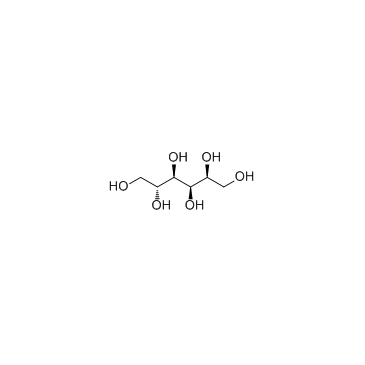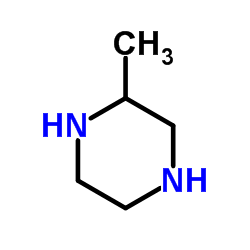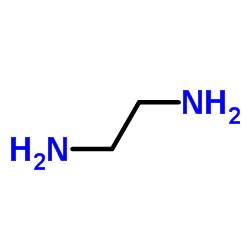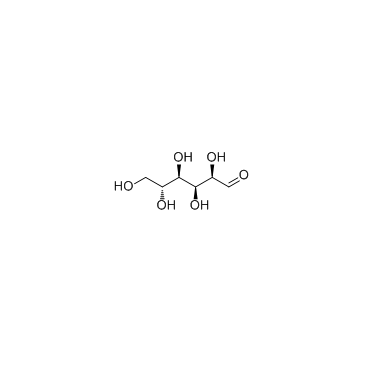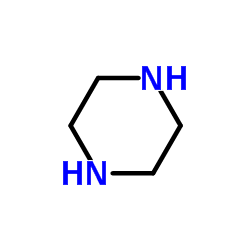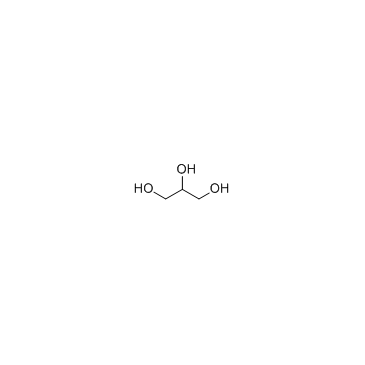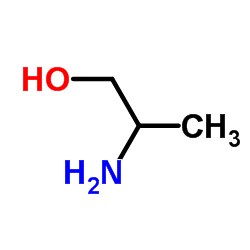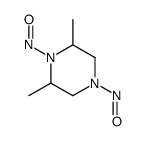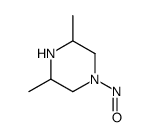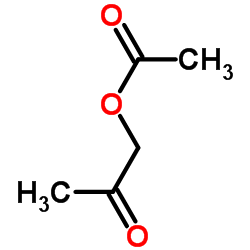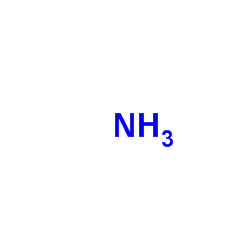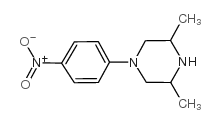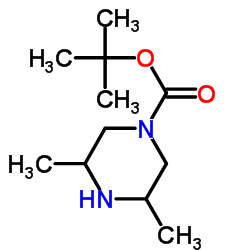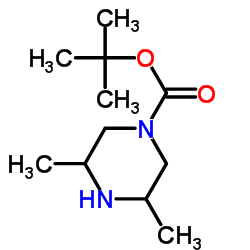108-49-6
| Name | 2,6-Dimethylpiperazine |
|---|---|
| Synonyms |
2,6-Dimethylpiperazine
3,5-dimethylpiperazine MFCD07772435 cis-2,6-dimethyl piperazine 2,6-Dimethylpiperazin 2,6-di-methylpiperazine Piperazine,2,6-dimethyl cis-3,5-dimethyl piperazine Piperazine,6-dimethyl EINECS 203-588-9 |
| Density | 0.8±0.1 g/cm3 |
|---|---|
| Boiling Point | 161.1±8.0 °C at 760 mmHg |
| Melting Point | 108-111 °C(lit.) |
| Molecular Formula | C6H14N2 |
| Molecular Weight | 114.189 |
| Flash Point | 45.0±0.0 °C |
| Exact Mass | 114.115700 |
| PSA | 24.06000 |
| LogP | -0.19 |
| Vapour Pressure | 2.3±0.3 mmHg at 25°C |
| Index of Refraction | 1.413 |
Synonym: Section 2 - COMPOSITION, INFORMATION ON INGREDIENTS
Risk Phrases: 11 36/37/38 Section 3 - HAZARDS IDENTIFICATION EMERGENCY OVERVIEW
Highly flammable. Irritating to eyes, respiratory system and skin. Potential Health Effects Eye: Causes eye irritation. Skin: Causes skin irritation. May be harmful if absorbed through the skin. Ingestion: May cause irritation of the digestive tract. May be harmful if swallowed. Inhalation: Causes respiratory tract irritation. May be harmful if inhaled. Chronic: Not available. Section 4 - FIRST AID MEASURES Eyes: Flush eyes with plenty of water for at least 15 minutes, occasionally lifting the upper and lower eyelids. Get medical aid. Skin: Get medical aid. Flush skin with plenty of water for at least 15 minutes while removing contaminated clothing and shoes. Ingestion: Do NOT induce vomiting. If conscious and alert, rinse mouth and drink 2-4 cupfuls of milk or water. Inhalation: Remove from exposure and move to fresh air immediately. If not breathing, give artificial respiration. If breathing is difficult, give oxygen. Get medical aid. Notes to Physician: Section 5 - FIRE FIGHTING MEASURES General Information: As in any fire, wear a self-contained breathing apparatus in pressure-demand, MSHA/NIOSH (approved or equivalent), and full protective gear. Will burn if involved in a fire. This material in sufficient quantity and reduced particle size is capable of creating a dust explosion. Flammable solid. Extinguishing Media: Use water spray to cool fire-exposed containers. Use water fog, dry chemical, carbon dioxide or alcohol type foam. Section 6 - ACCIDENTAL RELEASE MEASURES General Information: Use proper personal protective equipment as indicated in Section 8. Spills/Leaks: Vacuum or sweep up material and place into a suitable disposal container. Remove all sources of ignition. Use a spark-proof tool. Section 7 - HANDLING and STORAGE Handling: Use spark-proof tools and explosion proof equipment. Avoid breathing dust, vapor, mist, or gas. Avoid contact with skin and eyes. Storage: Keep away from sources of ignition. Store in a cool, dry place. Store in a tightly closed container. Flammables-area. Section 8 - EXPOSURE CONTROLS, PERSONAL PROTECTION Engineering Controls: Facilities storing or utilizing this material should be equipped with an eyewash facility and a safety shower. Use adequate ventilation to keep airborne concentrations low. Exposure Limits CAS# 108-49-6: Personal Protective Equipment Eyes: Not available. Skin: Wear appropriate protective gloves to prevent skin exposure. Clothing: Wear appropriate protective clothing to prevent skin exposure. Respirators: Follow the OSHA respirator regulations found in 29 CFR 1910.134 or European Standard EN 149. Use a NIOSH/MSHA or European Standard EN 149 approved respirator if exposure limits are exceeded or if irritation or other symptoms are experienced. Section 9 - PHYSICAL AND CHEMICAL PROPERTIES Physical State: Crystalline powder Color: ochre Odor: Not available. pH: Not available. Vapor Pressure: Not available. Viscosity: Not available. Boiling Point: 162 deg C @ 760.0 Freezing/Melting Point: 106-111 deg C Autoignition Temperature: Not available. Flash Point: 44 deg C ( 111.20 deg F) Explosion Limits, lower: Not available. Explosion Limits, upper: Not available. Decomposition Temperature: Solubility in water: Slightly soluble. Specific Gravity/Density: Molecular Formula: C6H14N2 Molecular Weight: 114.19 Section 10 - STABILITY AND REACTIVITY Chemical Stability: Stable under normal temperatures and pressures. Conditions to Avoid: Incompatible materials, light, ignition sources, exposure to moist air or water. Incompatibilities with Other Materials: Strong oxidizing agents, strong acids. Hazardous Decomposition Products: Nitrogen oxides, carbon monoxide, carbon dioxide. Hazardous Polymerization: Has not been reported. Section 11 - TOXICOLOGICAL INFORMATION RTECS#: CAS# 108-49-6 unlisted. LD50/LC50: Not available. Carcinogenicity: 2,6-Dimethylpiperazine - Not listed by ACGIH, IARC, or NTP. Section 12 - ECOLOGICAL INFORMATION Other No information available. Section 13 - DISPOSAL CONSIDERATIONS Dispose of in a manner consistent with federal, state, and local regulations. Section 14 - TRANSPORT INFORMATION IATA Shipping Name: FLAMMABLE SOLID, ORGANIC, N.O.S.* Hazard Class: 4.1 UN Number: 1325 Packing Group: II IMO Shipping Name: FLAMMABLE SOLID, ORGANIC, N.O.S. Hazard Class: 4.1 UN Number: 1325 Packing Group: II RID/ADR Shipping Name: FLAMMABLE SOLID, ORGANIC, N.O.S. Hazard Class: 4.1 UN Number: 1325 Packing group: II Section 15 - REGULATORY INFORMATION European/International Regulations European Labeling in Accordance with EC Directives Hazard Symbols: XI F Risk Phrases: R 11 Highly flammable. R 36/37/38 Irritating to eyes, respiratory system and skin. Safety Phrases: S 16 Keep away from sources of ignition - No smoking. S 26 In case of contact with eyes, rinse immediately with plenty of water and seek medical advice. S 33 Take precautionary measures against static discharges. S 37/39 Wear suitable gloves and eye/face protection. WGK (Water Danger/Protection) CAS# 108-49-6: No information available. Canada CAS# 108-49-6 is listed on Canada's NDSL List. CAS# 108-49-6 is not listed on Canada's Ingredient Disclosure List. US FEDERAL TSCA CAS# 108-49-6 is listed on the TSCA inventory. SECTION 16 - ADDITIONAL INFORMATION N/A |
| Symbol |


GHS02, GHS07 |
|---|---|
| Signal Word | Danger |
| Hazard Statements | H228-H315-H319-H335 |
| Precautionary Statements | P210-P261-P305 + P351 + P338 |
| Personal Protective Equipment | dust mask type N95 (US);Eyeshields;full-face particle respirator type N100 (US);Gloves;respirator cartridge type N100 (US);type P1 (EN143) respirator filter;type P3 (EN 143) respirator cartridges |
| Hazard Codes | F:Flammable;Xi:Irritant; |
| Risk Phrases | R11;R36/37/38 |
| Safety Phrases | S26-S36 |
| RIDADR | UN 1325 4.1/PG 2 |
| WGK Germany | 3 |
| Packaging Group | III |
| Hazard Class | 4.1 |
| HS Code | 2933599090 |
|
~%
Detail
|
| Literature: US2010/311973 A1, ; Page/Page column 11 ; |
|
~%
Detail
|
| Literature: US2010/311973 A1, ; Page/Page column 11 ; |
|
~%
Detail
|
| Literature: US2010/311973 A1, ; Page/Page column 10 ; |
|
~%
Detail
|
| Literature: US2010/240894 A1, ; Page/Page column 10 ; |
|
~%
Detail
|
| Literature: US2010/240894 A1, ; Page/Page column 13-15 ; |
|
~%
Detail
|
| Literature: US2010/240894 A1, ; Page/Page column 12-13; 14 ; |
|
~% 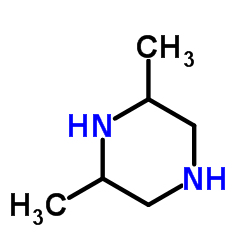
108-49-6 |
| Literature: Journal of Organic Chemistry, , vol. 45, # 24 p. 4931 - 4935 |
|
~% 
108-49-6 |
| Literature: Journal of Organic Chemistry, , vol. 45, # 24 p. 4931 - 4935 |
|
~% 
108-49-6 |
| Literature: Yuki Gosei Kagaku Kyokaishi, , vol. 17, p. 131,132, 135 Chem.Abstr., , p. 11392 |
| Precursor 8 | |
|---|---|
| DownStream 5 | |
| HS Code | 2933599090 |
|---|---|
| Summary | 2933599090. other compounds containing a pyrimidine ring (whether or not hydrogenated) or piperazine ring in the structure. VAT:17.0%. Tax rebate rate:13.0%. . MFN tariff:6.5%. General tariff:20.0% |


